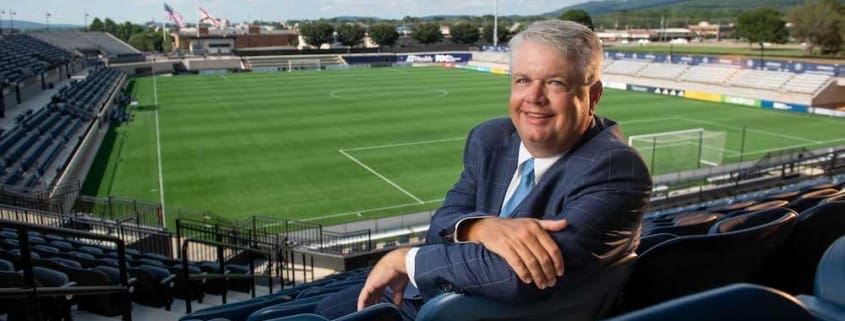Recreational facilities are the crux of Alabama’s growing sports tourism business
World-class pickleball facilities in Opelika.
A brand-new multi-purpose Protective Stadium in downtown Birmingham.
Sixteen outdoor fields and an indoor facility in Foley.
Cross country in Huntsville, and fishing tournaments in the Shoals.
Pick a community, big or small, in Alabama, and chances are you’ll find new or refreshed facilities to welcome sporting events and tourism dollars.
College football, NASCAR and professional golf have always been big draws, but sports tourism is drawing even more visitor dollars to more places now that they’re actively seeking out the likes of baseball, basketball, lacrosse and many other sports on a local, regional, national and sometimes international level.
“Sports tourism has been around for years and years and years,” says Joel Lamp, convention sales manager and sports manager for the Huntsville/Madison County Convention & Visitors Bureau. “But then with the growth of travel sports it really kind of took off in the last 15 to 20 years. Cities realized that there is a ton of money in sports tourism.”
In Huntsville, that means venues like John Hunt Park, known for its cross-country facilities; the Merrimack Soccer Complex; Joe Davis Stadium; and more.
“There’s been a commitment from Huntsville to own the cross-country market,” Lamp says. “We built a disc golf course into the cross-country course, and now we’ve got multiple sports in that venue, along with a world-class beach volleyball complex.”
Lamp says that sports tourism is “something that any city with smart investment can get involved in,” and he’s launched a sports tourism podcast with colleagues from Fort Worth, Texas; Spokane, Washington; and Grand Junction, Colorado, to talk about it.
“There are so many opportunities out there that you can scratch the surface really quick and realize, hey, I can invest $5 million and build a really nice softball complex, and now I’m in the softball business.”
And Alabama is just scratching the surface of what sports tourism can bring in.
“The world of sports is so massive,” Lamp says. “It can start locally and slowly build momentum until you’re hosting the national championship of cross country. Or the renovation we’ve made at Joe Davis Stadium, turning it into a rectangle field. Now the possibilities have gone from being the home of the soccer team to can we bring a rugby match there, or lacrosse or field hockey? If it’s on a rectangle field, we have a great stadium.”
It translates into big money. For example, Huntsville hosted 59 sporting events last year, bringing in more than $32 million in economic impact and generating more than 52,000 room nights, according to Lamp.
Room nights — or how many hotel rooms are booked — are especially important, and that’s why sports tourism can help put “heads in beds” during time periods that would otherwise be slow.
In the case of Foley, it helped put heads in beds following the Deepwater Horizon oil spill in 2010.
“Nobody wanted to come to the beach, and yet we were able to still attract people to come and compete in athletic events over the summer,” says David Thompson, executive director of leisure services for Foley Sports Tourism.
That kicked off the city of Foley’s investment in athletic facilities, including 16 outdoor fields and a 90,000-square-foot indoor center, and the city hosts soccer, cross country, volleyball, gymnastics and other events, mainly during off-season at the beach.
“We were good during the peak seasons, but during the off-season, we didn’t have much going on,” Thompson says. “Our goal is to drive the economy during that time by bringing people to town.”
Sports tourism on the coast, which also includes many events in Gulf Shores, Orange Beach and the Mobile area, also helps overall with maintaining seasonal workers, according to Thompson.
“The coastal communities hire seasonal workers, and we’re trying to make them year-round workers, because hiring seasonal workers can be a challenge,” he says. “But once they get through the season, we do a really good job of keeping them busy during the weekends during a season they normally wouldn’t have had jobs.”
Sports tourism is competitive across Alabama, but often the state works together to try and get sporting events to come here. Sports Alabama is a group that includes 12 organizations from around the state that often will attend conventions together to market not only their specific venues but the state as a whole.
“At the end of the day, if we can bring people to Alabama vs. a Mississippi or Tennessee, then we’ve done a really good job,” says Tami Reist, president and CEO of Visit North Alabama, which represents more than 20 communities.
The statewide group also compiles economic data, and some highlights from the Sports Alabama 2022 annual report help tell the tale of the success of sports tourism in the state:
Auburn-Opelika Tourism reported $21.7 million in economic impact, including three regional NCAA championships and four pickleball events that brought in $800,000.
Visit Dothan reported $22 million in economic impact from events including a USTA junior clay court event and an LPGA Q Series tournament.
The Shoals hosted a number of fishing tournaments that contributed to an economic impact of $15 million.
Gulf Shores/Orange Beach Sports and Events bought 111 acres in 2022 in northeast Gulf Shores expressly to “maintain and grow sports and event tourism in the future.”
Sports tourism is such a big deal in the tourism world, and still relatively new, but many folks don’t know it exists, so Reist has spearheaded a Sports, Travel & Tourism high school career and technical education course that will be available in high schools beginning this year.
The curriculum was put together by Lamp, Reist and Auburn-Opelika Tourism Sports and Event Development Director Anthony Terline.
“It’s something that will give kids an opportunity to learn about an industry that now many people know about,” Lamp says. “There are so many different opportunities in this industry, and giving kids an opportunity to get started early and learning through this curriculum is a big step for the state.”
Reist hopes the new curriculum will help organizations meet the demand for employees in the growing sports tourism industry.
“It’s growing to the point that a lot of your tourism bureaus are adding people just to handle the sports,” she says. “We are just trying to educate our high-schoolers and get them acclimated to it, so if they take this course, they might eventually move to the college level. Then, when they’re ready to graduate, they could be interning with us and eventually have the opportunity for a job.”
All agree that sports tourism is just getting started in Alabama.
“The big thing is the commitment from leadership to invest in facilities that work both for the population, the citizens of the community, and that can create an economic impact outside of that,” Lamp says.
Alec Harvey is executive editor of Business Alabama, based in Birmingham. David Higginbotham is a freelance contributor based in Decatur.
This article appears in the August 2023 issue of Business Alabama.






